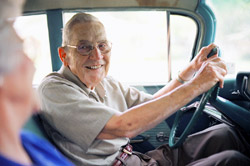The surge of baby boomers now entering their 60s means more drivers on the road who may be impaired by dementia or other cognitive impairments linked to aging. Researchers at the Alzheimer’s Disease Research Center (ADRC) of Washington University School of Medicine in St. Louis and elsewhere have developed a three-hour workshop that trains health care providers to identify potentially unsafe drivers with dementia and to encourage appropriate retirement from driving.

“The reporting process is anonymous,” Meuser says. “And the federal Health Insurance Portability and Accountability Act (HIPAA), which places strict regulations on patient privacy, should not apply to this, because HIPAA allows for state reporting to protect public safety and health.”
When a report has been filed, drivers are notified by the Department of Revenue that they have several options for proving they can still drive safely, starting with a statement from their physicians. Drivers may also have to retake the standard on-road driving safety test administered by the State Highway Patrol.
“Officials with the Department of Revenue, with the State Highway Patrol, and with the Missouri Department of Transportation have been an absolute joy to work with,” Meuser notes. “They are very concerned about older driver safety and have welcomed us as researchers with open arms.”
Pat Niewoehner, workshop coauthor and a driver rehabilitation specialist with the St. Louis Veteran’s Administration Medical Center, demonstrates the role of the occupational therapist – driver rehabilitation specialist in evaluating medical fitness to drive. Another coauthor, Marla Berg-Weger, Ph.D., professor of social work at Saint Louis University, shows physicians how they can cooperate with family members to eliminate patient access to driving and seek alternate forms of transportation that allow patients to continue to lead fulfilling lives. Included is a videotaped dramatization of a physician working with a demented patient and a family member.
“It’s important for healthcare providers to realize there are others who can help,” Meuser says.
The workshop was created with funding provided by the National Highway Traffic Safety Administration and the National Institute of Aging through the ADRC and John C. Morris, M.D., the Friedman Distinguished Professor of Neurology and ADRC director.
Additional educational efforts and research studies are or will soon be underway with support from NHTSA, the AAA Foundation for Traffic Safety, the AMA and the American Society of Aging.
“This is an exciting time for research and education in support of older driver safety, and there’s a role for just about everyone in these efforts,” says Meuser. “Above all, we must work together to ensure that older adults can remain mobile and productive even when they have to give up driving.”
Watch a sample case video from the ADRC
Meuser TM, Carr DB, Berg-Weger M, Niewhoehner P, Morris JC. Driving and dementia in older adults: implementation and evaluation of a continuing education project. Gerontologist 2006 Oct;46(5):680-687.
Funding from the National Highway Traffic and Safety Administration and the National Institute of Aging supported this research.
Washington University School of Medicine’s full-time and volunteer faculty physicians also are the medical staff of Barnes-Jewish and St. Louis Children’s hospitals. The School of Medicine is one of the leading medical research, teaching and patient care institutions in the nation, currently ranked fourth in the nation by U.S. News & World Report. Through its affiliations with Barnes-Jewish and St. Louis Children’s hospitals, the School of Medicine is linked to BJC HealthCare.